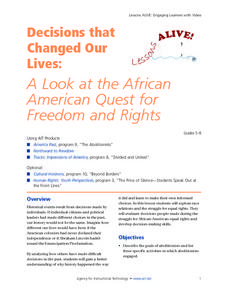Curated OER
Abolitionists and Their Impact on Sectionalism
Eleventh graders examine the impact of Abolitionist leaders on sectionalism. In small groups, they conduct research on a famous abolitionist, and develop and write a newspaper cover page based on their assigned abolitionist.
PBS
Henry David Thoreau: Author, Philosopher, and Abolitionist
What would Henry David Thoreau think of life in 21st-Century America? Pupils investigate the abolitionist using primary and secondary materials. They analyze what Thoreau would think of the changes to American lifestyles since the time...
PBS
Harriet Beecher Stowe: Author and Abolitionist
Scholars use primary documents, video clips, and legal decisions to uncover Harriet Beecher Stowe's motives for writing Uncle Tom's Cabin. They create a 21st century book jacket for the novel to capture the purpose behind Stowe's story.
Curated OER
The Abolitionist Movement: A Fight for Freedom
Sixth graders investigate the Civil War by identifying famous figures of the era. In this slavery abolitionist lesson, 6th graders read a text on the history of the Civil War and discuss heroes of the era such as Harriet Tubman and John...
PBS
Harriet Tubman: Abolition Activist
Imagine breaking out of prison only to continue to go back in to get others out. Welcome to the life of Harriet Tubman. Scholars research her amazing life and her impact on abolition in the United States. Using primary and secondary...
Curated OER
Movement and Music: An Introduction to Slavery
Students create a slavery timeline. They identify key leaders in the anti-slavery movement. Students are asked what they can recall about slavery. They review the following vocabulary words slavery, spirituals, abolitionists, and...
Curated OER
Abraham Lincoln and Frederick Douglass: A Compare and Contrast Lesson Plan
Two great men, one time period, and one purpose; it sounds like a movie trailer, but it's not. It's a very good comparative analysis lesson focused on Abraham Lincoln and Frederick Douglass. Learners will research and read informational...
Anti-Defamation League
Harriet Tubman on the $20 Bill: The Power of Symbols
How important are symbols and symbolic gestures in society? Middle schoolers have an opportunity to analyze the importance of symbols on American currency with a lesson that investigates the controversies surrounding redesigning the $5,...
Curated OER
Before Rosa Parks: Ida B. Wells
The contributions of Ida B. Wells to the Civil Rights Movement are the focus of this social studies lesson. Middle schoolers read a handout regarding Wells, discuss the handout, and write about non-conformist behavior.
Curated OER
Abolishing Slavery
Students explain the goals and methods of the abolitionist movement.
They identify key leaders in the movement. This lesson has adaptations for elementary through high school. Links are provided for resource readings.
Curated OER
The Colonization of Liberia
Students analyze how slavery shaped social and economic life in the South. They study methods of passive and active resistance to slavery, and the similarities and differences between African-American and white abolitionists.
West Virginia Department of Education
Declarations and the Quest for Life, Liberty and the Pursuit of Happiness
Understanding how John Brown got his inspiration from the Declaration of Independence helps learners further understand both West Virginia and United States history. The resource, a standalone, uses worksheets, discussion, and essay...
West Virginia Department of Education
An Act Worthy of Reward
John Brown is considered by many to be a martyr for abolition and civil rights. The resource covers an important event in West Virginian history, the raid by John Brown, as a standalone that discusses Brown's last words and his reaction...
PBS
The Meaning of the Fourteenth Amendment
The Fourteenth Amendment was extremely important to civil rights and is a crucial one to remember. The resource teaches about the Supreme Court decisions related to the amendment through writing exercises, reading, and working in small...
Curated OER
Decisions That Changed Our Lives: A Look At the African American Quest for Freedom and Rights
Students are introduced to the goals of abolitionists throughout history. In groups, they use the internet to discover the purpose of the Underground Railroad and why there were bus boycotts in the 1960s. They compare and contrast the...
Curated OER
Fredrick Douglass...A Digital History
Seventh graders research the life of Fredrick Douglass. In this Fredrick Douglass lesson, 7th graders read about his life and discuss it. They write poetry describing his experience as a slave and create their own monument for Fredrick...
Curated OER
Freedom Voices: Abolition and Suffrage in the United States
Students explore abolition and suffrage in the United States.
Curated OER
James McCune Smith: A Model of Resistance
Learners discuss examples of resistance. In this anti-slavery instructional activity, students analyze a portrait of James McCune Smith and listen to a lecture about his life and involvement in abolition. Learners analyze his actions and...
National Endowment for the Humanities
Slavery and the American Founding: The "Inconsistency Not to Be Excused"
High schoolers examine slavery in the revolutionary and colonial eras of the United States. In this slavery lesson, students investigate the presence of slavery in early America, the language of the Constitution, and the intent of the...
Curated OER
The Battle Over Reconstruction: The Politics of Reconstruction
High schoolers participate in a simulation as a Congress member to decide which policies to support in Reconstruction. In this Reconstruction era lesson, students read primary source documents to use as the basis for a mock debate. High...
Curated OER
Benjamin Franklin - Master of Electricity The Kite Experiment and the Invention of the Lightning Rod
Students study Benjamin Franklin including who he was, what he invented and his experiment. In this inventive instructional activity students follow the steps of Ben Franklin and build a Leyden jar.
Curated OER
Maroon Communities
High schoolers examine political and religious factors that influenced English, Spanish, French, and Dutch colonization of the Americas, how slavery shaped social and economic life in the South after 1800, and elements of slavery during...
Curated OER
Retain or Abandon, Adapt or Convert? The Immigrant's Dilemma
Young scholars read and discuss a narrative exploring how immigrants retain their own cultures or assimilate into the host country. They examine the emigrant's experience in Liberia and write a position paper.
Curated OER
The Literature of Upheaval
In groups, 8th graders read different documents and answer questions on the Civil War period. Students read documents by Thoreau, Stowe and Frederick Douglas.

























